It was a sensational moment when the Japanese national team won against Ireland the other day.
Honestly, I am not a rugby fan, I have never watched a rugby match from the start up to the last aside until the current world cup.
In 2015, Japan beat South Africa which was a huge upset, but I was sleeping because it was during the night in Japanese time and I was not even aware that the World Cup was being held in England.
I was in a relationship with a French man at that time and he told me that his father was very impressed by that, and I said “Oh?”
Yeah, I admit that now I am interested in the rugby World Cup because the presence of the Japanese team is getting bigger. I might appear a bit nationalistic.
Now I sometimes watch matches between other countries as well and I find it exciting but I cannot say I fully understand the rules. I often get confused.
Anyway, after the upset by Japan this time, I checked the replies to the topic on Twitter in English because I wanted to see people praising “Japan” (Yes, I am now a bit patriotic….). However, I also found some vulgar comments like “Are you sure they are really Japanese?” or “hardly call them Japan (while) only 2 japs (“jap” is a racist word in case you are not aware of that) there”.
This blog is about tourism in Japan, and this World Cup attracted many supporters to Japan. So this time I would like to write about this.
- How many players are “Japanese” in the Japanese team?
- 16/31 of the national members have Japanese names (meaning that they have a Japanese ethnic background)
- 9 of them are already Japanese
- Amanaki Lelei Mafi :he has a Japanese wife and son
- Ataata Moeakiola: he graduated from a Japanese high school
- For the rest of the members of the team (4 players), they chose to represent Japan anyways. What’s the problem?
- How popular is rugby in Japan?
How many players are “Japanese” in the Japanese team?
First of all, I am really a liberal person and I really appreciate every member of the team for their contribution to the victory. Even if some of them are not <Japanese> with respect to their nationality or ethnicity, they chose to play as a member of Japan, and they are qualified.
Since I have lived in two European countries (England and France), I don’t want to say “Japanese” should be related to a single ethnicity (In fact, No. Compared to those countries, Japan does not have much diversity, but historically several ethnicities mingled in Japan as well).
However, just to clarify the question, now I will now list the <Japanese> players here.
16/31 of the national members have Japanese names (meaning that they have a Japanese ethnic background)
Here are the players whose full names are completely Japanese.
From: https://www.rugbyworldcup.com/teams/japan
| Name (in alphabets/Japanese) | played in the match vs Ireland | |
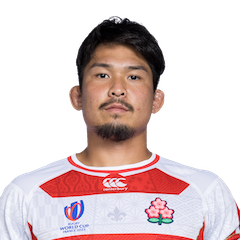 |
Kazuki Himeno 姫野 和樹 |
yes |
 |
Yoshitaka Tokunaga 德永 祥尭 |
|
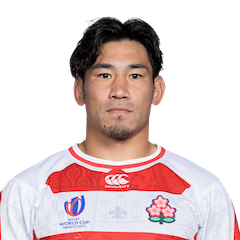 |
Ryoto Nakamura 中村 亮土 |
yes |
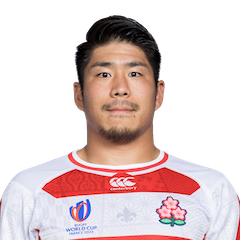 |
Rikiya Matsuda 松田 力也 |
|
 |
Yu Tamura 田村 優 |
yes |
 |
Kotaro Matsushima 松島 幸太朗 His mother is a Japanese researcher and his father was a Zimbabwean journalist specialising in economics. He was born in South Africa where his parents were working, but moved to Japan at the age of 6. He has had Japanese nationality since he was born…. I am specifically writing about this because I saw several tweets in which they insisted he is not Japanese. |
yes |
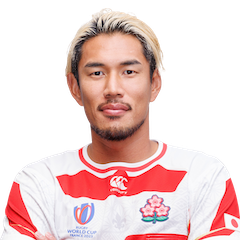 |
Ryohei Yamanaka 山中亮平 |
yes |
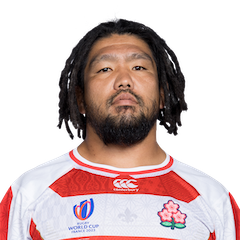 |
Shota Horie 堀江 翔太 |
yes, and MVP |
 |
Takuya Kitade 北出 拓也 |
|
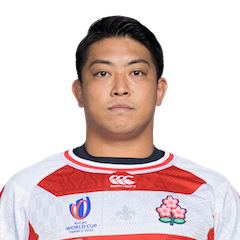 |
Atsushi Sakate 坂手 淳史 |
|
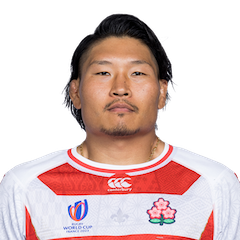 |
Keita Inagaki 稲垣 啓太 |
yes |
 |
Yusuke Kizu 木津 悠輔 |
|
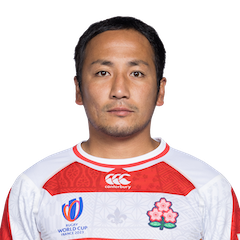 |
Yutaka Nagare 流 大 |
yes |
 |
Kaito Shigeno 茂野 海人 |
|
 |
Fumiaki Tanaka 田中 史朗 |
yes |
 |
Kenki Fukuoka 福岡 堅樹 |
yes, he made the TRY and he ran for more than 50 meters holding the ball which was so impressive |
9 of them are already Japanese
9 of them have already Japanese citizens through naturalization. Japan basically does not allow its citizens who are older than 21 to have dual nationalities. It must have been a difficult decision.
They all speak Japanese fluently.
| Name and birth country | ||
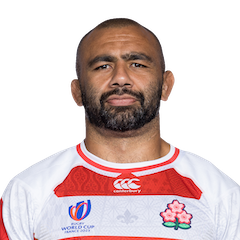 |
Michael Leitch
New Zealand |
naturalized to Japan in 2013, but he moved to Japan at the age of 15 and studied in Japanese high school and University. He sometimes showed up on Japanese TV shows (not rugby related) and gained many fans because of his hilarious comments (of course in fluent Japanese) and friendliness. |
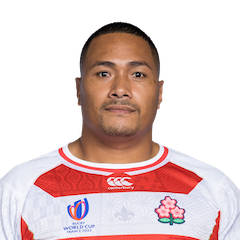 |
Asaeli Ai Valu Ai is written with 愛 (Love, or affection) instead of Japanese phonetic letters.Tonga |
naturalized in 2014, but he moved to Japan to enter a high school and got a diploma from a Japanese University too. |
 |
Isileli Nakajima
Tonga |
naturalized in 2015 but he has lived in Japan since 2008 when he entered a Japanese University. He is married to a Japanese woman from whom he took the family name “Nakajima(中島)”. |
 |
Uwe Helu
Tonga |
naturalized in 2016. He relocated to Japan at the age of 19 to enter a Japanese University. |
 |
Hendrik Tui
New Zealand |
naturalized in 2014. He relocated to Japan to enter Teikyo University at the age of 19. |
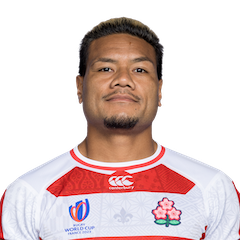 |
Lomano Lemeki
New Zealand but his nationality before naturalization to Japan was Tonga |
naturalized in 2014. He came to Japan in 2008 when he joined Canon. He has 4 children with his Japanese wife. |
 |
Timothy Lafaele
Samoa and New Zealand |
naturalized in 2017. He studied in a Japanese university, since then he has lived in Japan. |
 |
Luke Thompson
New Zealand |
Naturalized in 2010. He came to Japan to join Sanyo in 2004. He speaks Osaka dialect which makes him sound humorous. He did not study in Japanese schools and he was already in his 20s when he came to Japan, so it’s impressive to see him speak very good Japanese. |
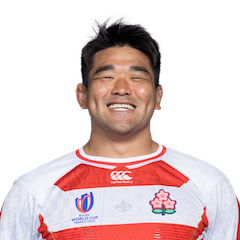 |
Jiwan Koo
South Korea |
Naturalized in 2015. He was born in Seoul, but he has been living in Japan since he was 12. His father and older brother also played in the rugby team of Honda. |
Amanaki Lelei Mafi :he has a Japanese wife and son
 |
Amanaki Lelei Mafi
Tonga |
I did not find any reference which indicates he is naturalized to Japan, so I assume he is still Tongan. He has been living in Japan since 2010 when he entered a Japanese University, and he got married to a Japanese woman in 2015. One year later, his son was born. |
Ataata Moeakiola: he graduated from a Japanese high school
 |
Ataata Moeakiola
Tonga |
He was scouted to a rugby team of a high school in Tokyo and proceeded to a University in Japan. |
For the rest of the members of the team (4 players), they chose to represent Japan anyways. What’s the problem?
Pieter Labuschagne, William Tupou, James Moore and Wimpie Vanderwalt, they have been all playing in Japanese league for at least 3 years, that’s why they are qualified.
Their contributions are very much appreciated by Japanese fans. Actually, now I’m worried because this post might be offensive to them.
I heard that the players cannot change their national team once they represent a certain country, so they made a big decision anyways.
Besides Japan is far from the country which has the biggest number of foreign born players.
How popular is rugby in Japan?
I am giving an opinion on this from a “not so passionate sports fan” perspective.
The popularity with rugby in Japan? I can say it has always been a well-known sport but not the most popular one
I would say, “not the most popular, but always so so”.
It’s true that it is very recent that people like me started paying attention to rugby, but it could be said that at least everyone has known the shape of the ball since the middle of the 20th century, I suppose…
I guess most high schools and colleges have their rugby teams unless the school is only for girls.
I vaguely knew that “Hanazono” is the place where the national tournament is held for high school players and I can name some Universities which are famous for their performance in rugby.
In the 80’s, a TV series about a coach and high school students who were aiming at Hanazono was very popular and the plot was based on a real story from the 70’s.
“Rugger man type” is commonly used to describe the guys who are very muscular.
So you can imagine that rugby is well recognised in Japan.
Both American and European sports are played in Japan
However, rugby is not particularly popular at the same time. I think the 2 major team sports among boys are baseball and football (soccer in American English).
Baseball…? I know you are not familiar with this sport if you are European. However, baseball has been by far the most popular sport since the 19th century. Japan was greatly influenced by the US even before WW2. In the beginning, it was played in high schools and universities, and the professional league was established in 1936.
For football (soccer), the professional league was established in the 90’s, but it was always popular among kids. The famous Manga “Captain Tsubasa” was created in 1981, and I suppose it made a big hit judging from the popularity of football among kids.
In Japan, each secondary school (middle schools and high schools) offers activities that are not mandatory but I guess more than 50% participate one. Schools have various sports teams, and students usually cannot join more than one team. Once you join the football team, you need to focus on it, and if the team is very strong (e.g. always in the top 8 of the prefecture or city), then the school life is probably very tough. You have to go to school 2 hours before your first class starts to do morning practice and to have lunch during the 10 minutes break before the last class in the mornings in order to use your lunch break for practice, and of course you need to stay in school after classes end everyday. The practice is managed by each sport team, so you will not have many chances to do other sports than the one you selected during your secondary education.
Rugby is one of them.
For boys, baseball and football are the 2 major ones, and then maybe swimming, tennis, volleyball (rather more popular among girls than boys), basketball, and track and fields follow. It depends on the generation, but overall, they are always very major. The French guy boasted one day about his country’s results in Judo. Well, Japan is still strong at Judo, but it’s not so popular a sport compared to those others nowadays.
Rugby is on the same tier as Judo I guess. American football is also played in Japan at the same level. Amefuto is the abbreviation that is commonly used for American football.
For secondary education (age 12-18), Japanese kids usually have 3 years of middle school (mandatory) and 3 years of high school (not mandatory but the rate has always been higher than 95% since the 1960s) separately, unless they go to a combined school for 6 years. And I guess it’s not so common for local middle schools to have rugby teams but most high schools have one. On the other hand, I have never known any middle schools (except for girls school) which do not have the teams of the sports I named above listed (baseball, football, swimming, basketball, tennis…).
On the other hand, I have never heard about students playing cricket intensively in secondary schools in Japan.
So my point is, rugby is not so minor among Japanese, but not as popular as in New Zealand or other strong countries at all.
I think less than 1% of Japanese guys have actually played rugby. But baseball, football, basketball, or swimming, are usually part of PE class even in primary schools, so…almost all Japanese have done at least one of these in their lives.
I hope this helps for those who are curious about the situation in Japan!



